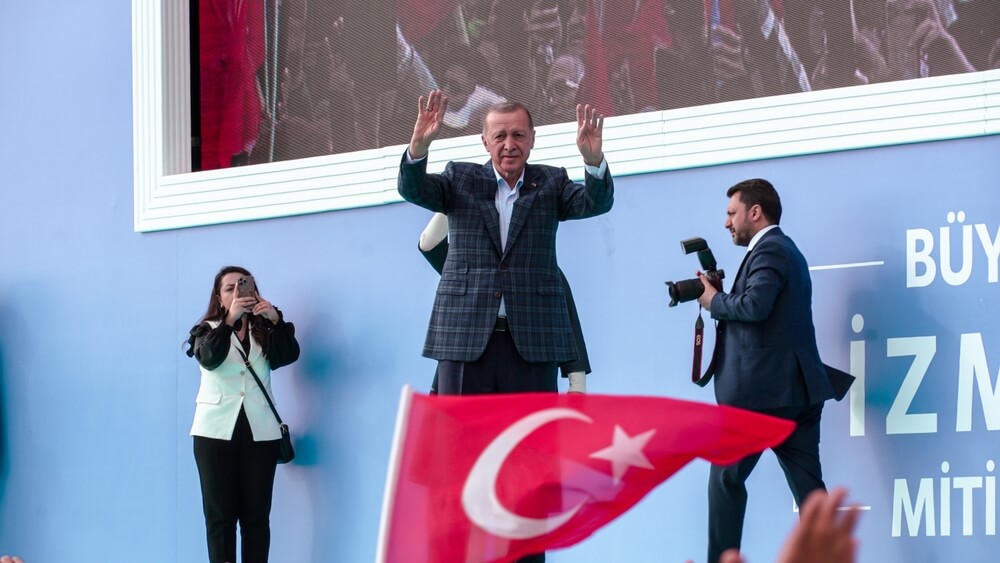Turkish President Recep Tayyip Erdoğan and his Justice Development Party (AKP) suffered their heaviest defeat since they have been in power in local elections last Sunday. However, expectations of an imminent end to their era will have to wait.
The opposition candidates won decisive victories in Turkey's main cities, including Istanbul and Ankara, which they have governed since 2019.
Erdoğan's attempt to regain these cities, despite his full participation and intensive campaign, did not yield the desired outcomes.
The president's party was also defeated in other big cities - Izmir, Bursa, Antalya - and inland regions where it held local power for years, including the extreme southeast, which suffered heavily in last year's earthquake.
And finally, in the sum of local results at national level, Istanbul Mayor Ekrem İmamoğlu's opposition Republican People's Party (CHP) won over Erdoğan's AKP (38% to 35%).
Was it a referendum on Erdoğan?
This gave rise to interpretation that the local elections were a kind of national referendum in which the stakes were much higher than the power in thousands of local governments. The stakes regarded the overall national policy, primarily the difficult economic situation, multi-year general price growth and massive inflation of almost 70%.
However, the thesis that it was actually a referendum on the overall Erdoğan’s rule under the guise of local elections does not answer the question:
Why were such results lacking less than a year ago (in the presidential and parliamentary elections) when the politics of the state and its leader were directly tested?
Why, in less than a year, did Turkish voters give 2 different answers?
Why, in less than a year, did Turkish voters give 2 different answers? First, they gave another mandate to President Erdoğan and a large parliamentary majority to his party, and, after 10 months, they convincingly asked for changes at the local level, voting for the opposition.
What has changed so much in Turkey in such a short period, and has anything actually changed for the country to present 2 completely different positions of its political mood?
Symbolism of Istanbul
As the largest city and economic capital, Istanbul was a symbol at the centre of local elections. The competitors have invested significant resources in the campaign because the victory in Istanbul goes beyond the city limits politically.
Confirmation of the new mandate for Mr İmamoğlu is a reflection, on the one hand, of the political mood of the citizens towards his past work, but even more towards the state policy of President Erdoğan, with which they disagree.
With his repeated victory in Istanbul, Ekrem İmamoğlu won another, perhaps even more significant, victory within the rather disunited opposition bloc. Now, he has positioned himself as a crucial opposition figure and the only one who has a chance to become president of Turkey in the next election round.
Since the announcement that İmamoğlu won again in Istanbul last Sunday, supporters see him as the clear presidential candidate and even the favourite in the 2028 elections
Last Sunday's elections showed Mr İmamoğlu not being the principal competitor to Erdoğan in the presidential elections was a fatal mistake of the 6-member opposition bloc.
Even though they made a significant effort and united to put forward a joint candidate, the choice of Kemal Kılıçdaroğlu was only a compromise to preserve the hard-won unity, but not enough to defeat Erdoğan.
Since the announcement that İmamoğlu won again in Istanbul last Sunday, supporters see him as the clear presidential candidate and even the favourite in the 2028 elections.
But until then, the era of Recep Tayyip Erdoğan will last, made possible by the opposition and its insufficient determination in last year's elections.
A failed test
The Turkish president was surprisingly tolerant and accepted the election results as the defeat of his party.
We should not forget that President Erdoğan reacted completely differently 5 years ago when, after the victory of İmamoğlu, he ordered a new vote and lost again.
"Under no circumstances will we disrespect our people's decision”, President Erdoğan told his supporters after informing them on Sunday that "unfortunately, they could not get the result that they wanted”.
 "Under no circumstances will we disrespect our people's decision” - Recep Tayyip Erdogan
"Under no circumstances will we disrespect our people's decision” - Recep Tayyip Erdogan
Perhaps he contributed to a poor result of AKP candidates across Turkey, as he practically hinted at his retirement from politics during the campaign, saying that it would be the last election he would actively participate in.
"The result that comes out of this election will be a transfer of a legacy to the brothers who will come after me”, Erdoğan said at the beginning of March.
Many of his supporters regarded this as a "goodbye", which was also the reason for the lack of votes that the AKP expected.
On the other hand, they did not have enough confidence in the young forces that Erdoğan offered as favourites for his political legacy, thus opening a space for the growth of opposition candidates.
If the most recent local elections served as the new post-Erdoğan set's trial run, it did not go well. Until the next parliamentary and presidential elections, there will be no similar opportunity, and, therefore, the Turkish leader and the AKP will have to test in the laboratory, inside their house, for the next few years, looking for a reliable "transfer of legacy" that Erdoğan talked about.
However, more significant than these tactical reforms, their future will be affected by the state of the economy and political freedoms, for which the majority of Turks confirmed their dissatisfaction last Sunday.